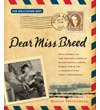 Dear Miss Breed
Dear Miss Breed |
Book Focus - February 2006
Dear
Miss Breed: True Stories of the Japanese American Incarceration
During World Was II and a Librarian Who Made a Difference
By Joanne Oppenheim
0-439-56992-3; $22.99; Scholastic Nonfiction; Ages 12 & up
Dear Miss Breed: True Stories of the Japanese American
Incarceration During World War II and a Librarian Who Made a Difference,
by Joanne Oppenheim, is published in February 2006 by Scholastic
Nonfiction, an imprint of Scholastic. This book tells a remarkable
story. Clara Breed (1906-1994) was the first children’s librarian
at the San Diego Public Library, and when the many Japanese American
children whom she knew were suddenly deported to camps, she kept
up a correspondence with them, sending them care packages and books.
The book is based on the many letters from the children she received
in return, which are now in the collection of the Japanese American
National Museum in Los Angeles.
Joanne Oppenheim has written a remarkable, fascinating, heart-rending
work woven together from numerous letters, photos, and drawings,
impeccably researched including appendix, source notes, bibliography
and index. In the following article, Liz Szabla, Editorial Director
of Scholastic Press, describes what it was like working with the
author.
 When Joanne
Oppenheim approached me a few years ago with the idea for a biography
on Clara Breed, Joanne was already deeply into her research for
the project. I’m sure my eyes grew wider as she told me she’d
already been in touch with several of Miss Breed’s “children”
– survivors of the incarceration of Japanese Americans during
World War II. Joanne’s interviewees had already entrusted
her not only with testimony, but also with a treasure trove of unpublished
personal photos and memorabilia.
When Joanne
Oppenheim approached me a few years ago with the idea for a biography
on Clara Breed, Joanne was already deeply into her research for
the project. I’m sure my eyes grew wider as she told me she’d
already been in touch with several of Miss Breed’s “children”
– survivors of the incarceration of Japanese Americans during
World War II. Joanne’s interviewees had already entrusted
her not only with testimony, but also with a treasure trove of unpublished
personal photos and memorabilia.
Joanne “met” Clara Breed when she began looking for
a Japanese American childhood friend online. She not only found
her classmate, but also a story that needed to be told. Her research
took her across the country as she met and interviewed survivors.
She spent a great deal of time in California, not only meeting with
individuals, but also mining the incredible resources housed at
the Japanese American National Museum in Los Angeles, among other
institutions.
Each time Joanne returned to New York, I received updates and progress
reports, all of which I found intriguing. But I have to admit I
wondered how she was going to weave all the great primary source
material together. She was gaining access to such riches –
letters, photos – and her interviews included memories that
some of Miss Breed’s “children” hadn’t expressed
before.
Then, in 2004, the first draft of the manuscript arrived. Its heft
was daunting! I dug in, and soon found I couldn’t put it down.
I was fascinated by the story told through the young Americans’
letters to Miss Breed and by the amazing oral histories Joanne had
obtained. And I was most strongly moved by how timely and relevant
the project was, given the fear and hysteria of our post-9/11 culture.
Streamlining the text was difficult for both of us; Joanne and I
grew very fond of certain letters and correspondents. During that
time, Joanne continued to discover source material of impressive
historical value. The day she handed me a yearbook from the high
school in the Poston internment camp, I was so awed at its significance
I could barely bring myself to hold it, let alone turn its yellowed
pages.
Dear Miss Breed is a book about injustice, but it is also a story
with many heroes: Clara Breed had the courage to speak out against
racial persecution; her “children” kept their courageous
spirits in spite of their incarceration. Clara and her children
have given us all a legacy we must never forget, and one we can
grow from. As one of Miss Breed’s children, Liz Yamada, says
in the foreword, “Thank you, Miss Breed. Thank you, Joanne
Oppenheim.”

